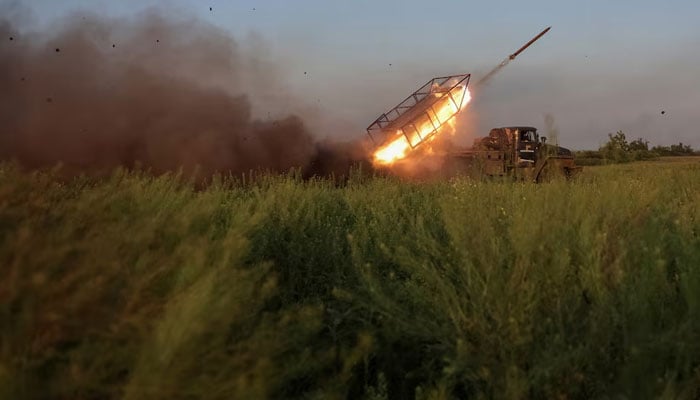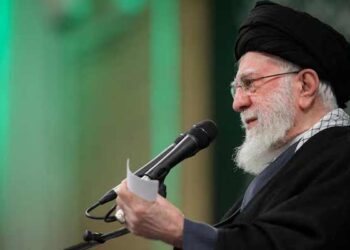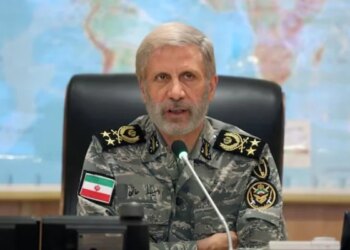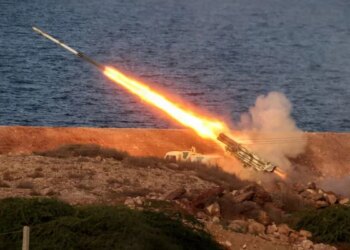Select Language:
Ukrainian servicemen from the 25th Separate Airborne Brigade deploy a BM-21 Grad multiple rocket launcher towards Russian forces amid the ongoing conflict. This exchange occurs near Pokrovsk, a frontline town in Donetsk region, Ukraine, on June 8, 2025. — Reuters
Kyiv and London are calling on the United States to adopt a more assertive stance ahead of President Donald Trump’s scheduled meeting with Russian President Vladimir Putin regarding efforts to end the war. There is concern that the upcoming talks could shift the advantage to Moscow.
European leaders revealed their own proposals for peace in Ukraine to U.S. officials on Saturday. Trump announced on Friday that he would meet with Putin in Alaska on August 15, suggesting that the involved parties, including Ukrainian President Volodymyr Zelenskyy, are close to an agreement that might resolve over three years of conflict.
While specific details of this potential agreement remain undisclosed, Trump indicated it would involve “some swapping of territories for mutual benefit.” Such concessions could see Ukraine surrender substantial parts of its territory — a move Kyiv and its European allies strongly oppose, asserting it would only encourage further Russian aggression.
U.S. Vice President JD Vance held discussions with Ukrainian and European representatives at Chevening House, a country estate southeast of London, to examine Trump’s peace initiatives. An European diplomatic source confirmed that a counterproposal was presented during the meeting, though no further details were disclosed.
According to the Wall Street Journal, European negotiators recommended that a ceasefire be established before any further steps and emphasized that territorial exchanges need to be mutual and accompanied by strong security guarantees. “You can’t begin negotiations by ceding territory during active fighting,” a European official said.
A U.S. government representative reported that extended discussions at Chevening yielded “significant progress” toward Trump’s goal of ending the Ukraine war, ahead of his upcoming meeting with Putin. The White House did not immediately reply to inquiries about whether European allies had submitted their counterproposals.
Meanwhile, UK Prime Minister Keir Starmer and French President Emmanuel Macron spoke and committed to pursuing a “just and enduring peace” in Ukraine. A Downing Street spokesperson stated that they discussed recent developments, reaffirmed their unwavering support for Zelenskyy, and emphasized their intent to collaborate closely with both Kyiv and Washington in the days ahead.
It remains unclear whether any agreements emerged from the Chevening discussions, but Zelenskyy described the meeting as productive. “All our concerns were listened to,” he said during his evening address to Ukrainians. “The path to peace must be determined together — and only together with Ukraine, that’s a vital principle.”
Earlier, Zelenskyy rejected any territorial concessions, asserting, “Ukrainians will not give up their land to the occupiers.” Macron also stressed Ukraine’s role in negotiations, emphasizing, “Ukraine’s future cannot be decided without the Ukrainians — they have fought relentlessly for over three years for their independence and security.” He added that Europe’s own security interests underscore the importance of involving Kyiv.
Since Trump’s envoy Steve Witkoff visited Moscow on Wednesday—an effort Trump described as making “great progress”—Zelenskyy has engaged in multiple calls with Ukraine’s allies. He underscored the need for “clear steps and maximum coordination” among partners.
Both Kyiv and the European Union are pushing back against proposals they see as too accommodating to Putin, whom they accuse of aggressive expansion. Moscow’s claims include four Ukrainian regions—Luhansk, Donetsk, Zaporizhzhia, and Kherson—as well as Crimea, forcibly annexed in 2014. However, Russian forces do not fully control all territory in these regions, and Russia has demanded Ukrainian withdrawal from its remaining holdings there.
Ukraine maintains a small presence in Russia’s Kursk region, a year after earlier incursions while Russia claims to have expelled Ukrainian forces from there in April. Tatiana Stanovaya, a senior fellow at the Carnegie Russia Eurasia Center, describes this peace effort as “the first somewhat realistic attempt to halt the war,” but expresses skepticism about the implementation of any agreements and warns that they could be detrimental to Ukraine.
Heavy fighting continues along a front stretching more than 1,000 km across eastern and southern Ukraine, with Russian troops gradually advancing in the east. Despite Moscow’s summer offensive, Ukrainian analysts report that gains have been limited so far, and Ukrainian fighters remain resolute.
Olesia Petritska, 51, told Reuters in Kyiv’s central square, decorated with hundreds of small Ukrainian flags honoring fallen soldiers, “No soldier will accept giving up territory or pulling back from Ukrainian land.”







